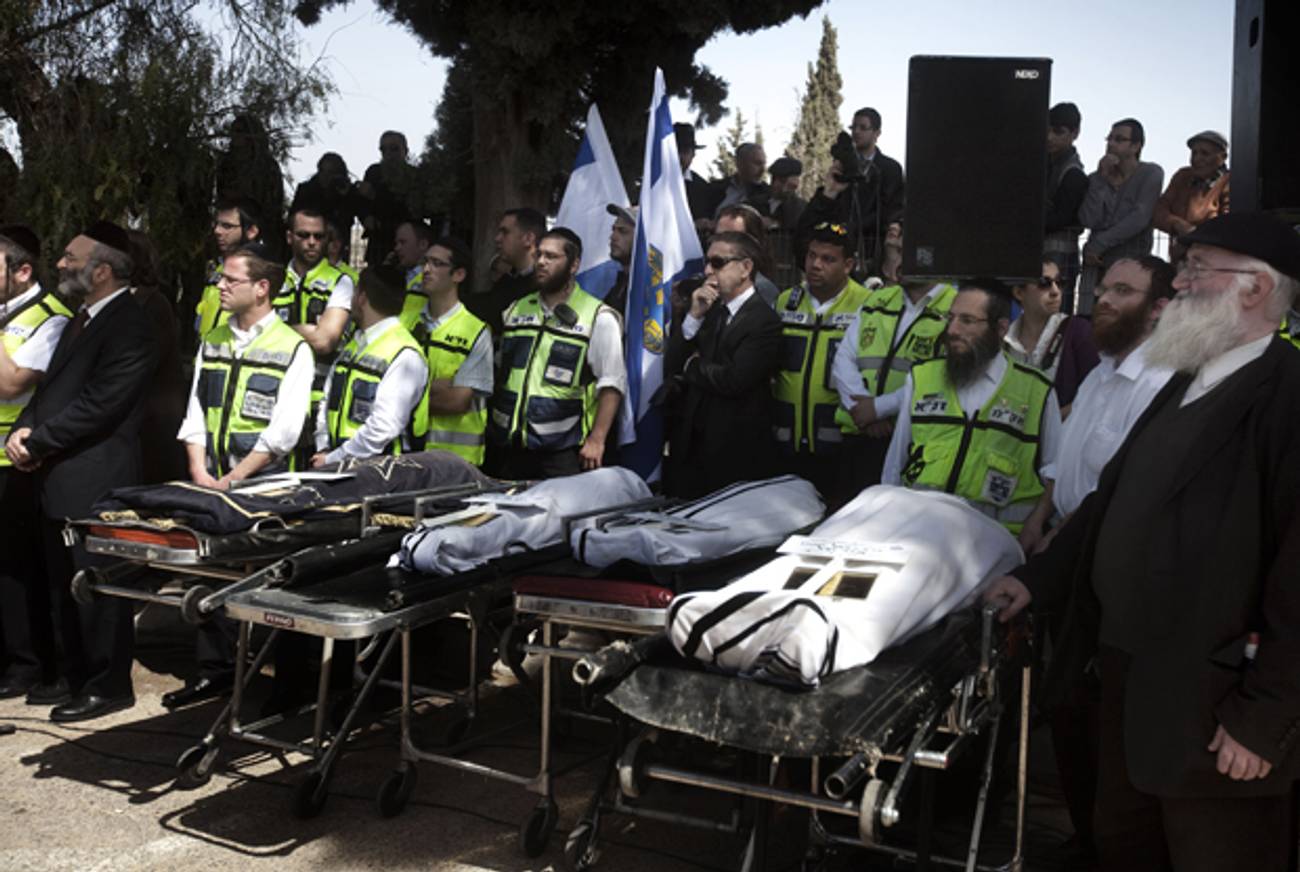Racial Profiling
The killing of Trayvon Martin was almost universally understood as racism. So, why is the Toulouse murderer just an “overgrown adolescent”?




Media coverage of the killing of 17-year-old Trayvon Martin by a “neighborhood watch volunteer” while he was drinking iced tea in a gated community in Sanford, Fla., has rightly been significant and indignant. Pundits and politicians in the United States and Europe have asked incisive questions about what role racial bias played in the murder. Rep. John Lewis, a Democrat from Georgia, compared the killing of Martin to the lynching of Emmett Till and said it presaged a “dark hour” for “race relations in America.” “Blackmaleness,” wrote the critic Toure in Time magazine, “is a potentially fatal condition.” Liberal filmmaker Michael Moore tweeted that in America, it isn’t safe for African Americans to walk after dark. On Friday, President Obama weighed in: “If I had a son,” he said, “he’d look like Trayvon.”
This outrage has been completely justified. But compare the coverage of the Martin killing to the rather different narrative that emerged in the media’s coverage of the Ozar Hatorah murders in Toulouse.
Here are the facts: Muhammed Merah chased 8-year-old Miriam Monsonego across the playground of Ozar Hatorah, the Jewish school she attended, grabbed her by the hair, and shot her in the head. Just moments before, he shot Gavriel Sandler (age 4), Aryeh Sandler (age 6), and their father, 30-year-old Rabbi Yonatan Sandler. In the two weeks prior to the murders at Ozar Hatorah, Merah shot three French soldiers—all Muslims—because, as he muttered on videos he shot of the murders, “You kill my brothers; I kill you.’”
Holed up in his apartment and surrounded by an anti-terror squad, Muhammed Merah called French state television and explained that it was necessary to shoot Jewish children and French soldiers as a protest against the country’s ban on the veil and the French military’s presence in Afghanistan. He added the requisite cri de coeur against the daily injustices visited upon the residents of Gaza and the West Bank.
Merah’s motivation seems blindingly clear. Apparently not. “Muhammed Merah stands before us like an overgrown adolescent, unemployed, at loose ends, soft-hearted but at the same time disturbed and incoherent,” Tariq Ramadan, professor of Islamic Studies at Oxford University, wrote on Friday. If only the “soft-hearted” jihadist had a job and higher self-esteem. Paris-based writer Diana Johnstone, who previously wrote a book doubting the Srebrenica massacre, told an interviewer that France’s “chickens were coming home to roost” because of its foreign policy. Britain’s Stop the War Coalition, fronted by Labour Party grandee Tony Benn, argued on its website that shooting children was “the terrible and disastrous outcome of the West’s war policies and anti-Muslim racism.” The article made no mention of anti-Semitism.
While those inhabiting the left-wing fringe apportioned blame to France and Israel’s policies, many mainstream media and political figures—lazily assuming this was an Anders Breivik-style terrorist attack—blamed the violence on the rhetoric employed by President Nicolas Sarkozy’s faltering re-election campaign.
Before Merah was fingered as the killer, centrist presidential candidate Francois Bayrou argued that murders in Toulouse “had their roots in the current state of French society,” referencing recent debates over immigration. The New York Times speculated that the shootings “were somehow inspired by anti-immigrant political talk,” arguing that Breivik’s mass murder in Oslo was provoked “in some way by too harsh a debate in Norway about immigrants and foreigners.” A column by the Guardian’s former Opinion page editor (and two unsigned editorials from the same paper) also implied the murders were the work of far-right terrorists, stirred to action by Sarkozy.
Never mind the raft of data showing the rise in anti-Jewish feeling in France. Many fretted that the killer’s religious affiliation would reflect poorly on his peaceful coreligionists. The Washington Post editorial board helpfully advised France that “more discrimination against Muslim communities is hardly the right response” to terrorism, while warning that “far-right leaders are seeking to exploit the tragedy.” How the country should combat Muslim anti-Semitism was left unexplored. During the siege of Merah’s apartment, France 24’s media editor James Creedon warned of the coming “free reign” of “far-right discourse” and the “risk of stigmatization” of French Muslims. Meantime, his channel’s psychological “profile” of Merah quoted an expert explaining that “a personal problem or the loss of a job or a political act” could have provoked the attacks. Again, no mention of anti-Semitism.
If mainstream critics want to minimize the influence and impact of far-right parties, they would be advised to address both Islamophobia and the attendant problems of extremism in immigrant communities. When concerns about Islamist influence are dismissed by mainstream parties as radioactive (and by pundits as subterranean racism), legitimate political issues are ceded to reactionary, opportunistic political parties. If you doubt this, just look at the relative success of the populist right in traditionally social democratic countries like France, Denmark, the Netherlands, Norway, and Switzerland where traditional parties have long ignored the prickly issues of immigration and assimilation.
It’s odd, then, to see sentences like this, in an Associated Press dispatch filed the day Merah was killed: “After authorities identified Merah, a man with a long record of petty crimes, Muslim and Jewish leaders joined in a single voice to warn against any bid to stigmatize Islam.”
Like America’s reaction to the murder of Trayvon Martin—who would likely be alive today had he been white—the French should move the debate toward the toxic anti-Jewish ideology that motivated Muhammed Merah.
Like this article? Sign up for our Daily Digest to get Tablet Magazine’s new content in your inbox each morning.
Michael Moynihan, Tablet Magazine’s “Righteous Gentile” columnist, is the cultural news editor of Newsweek/The Daily Beast.
Michael Moynihan, Tablet Magazine’s “Righteous Gentile” columnist, is the cultural news editor of Newsweek/The Daily Beast.